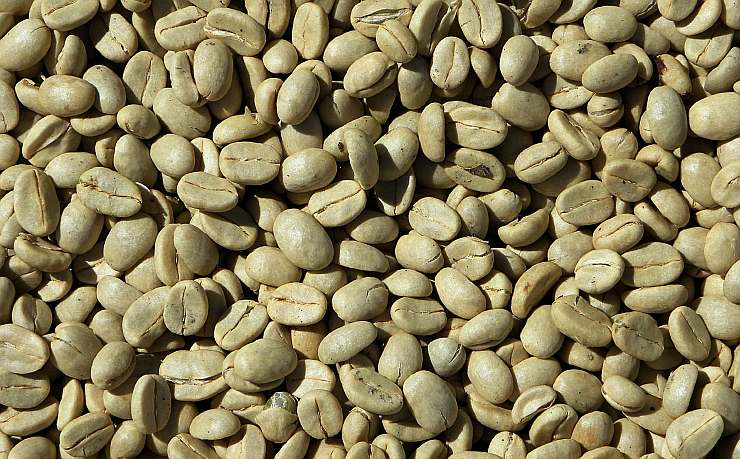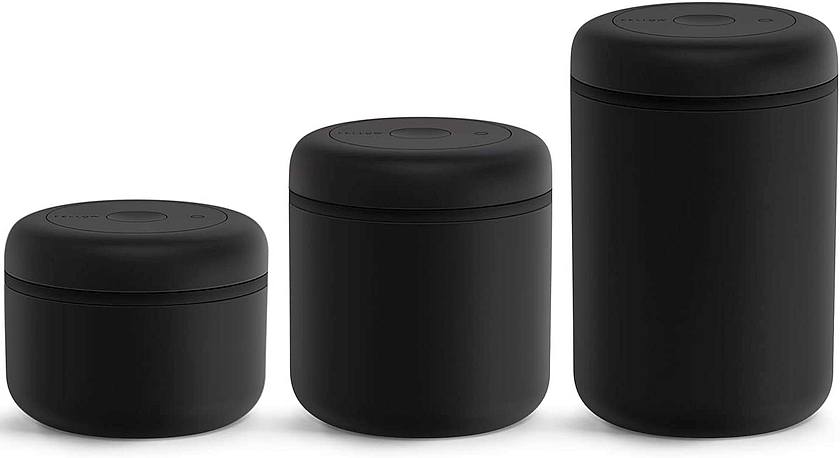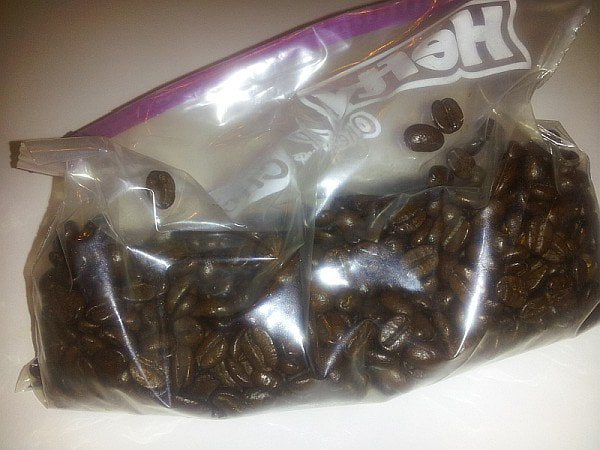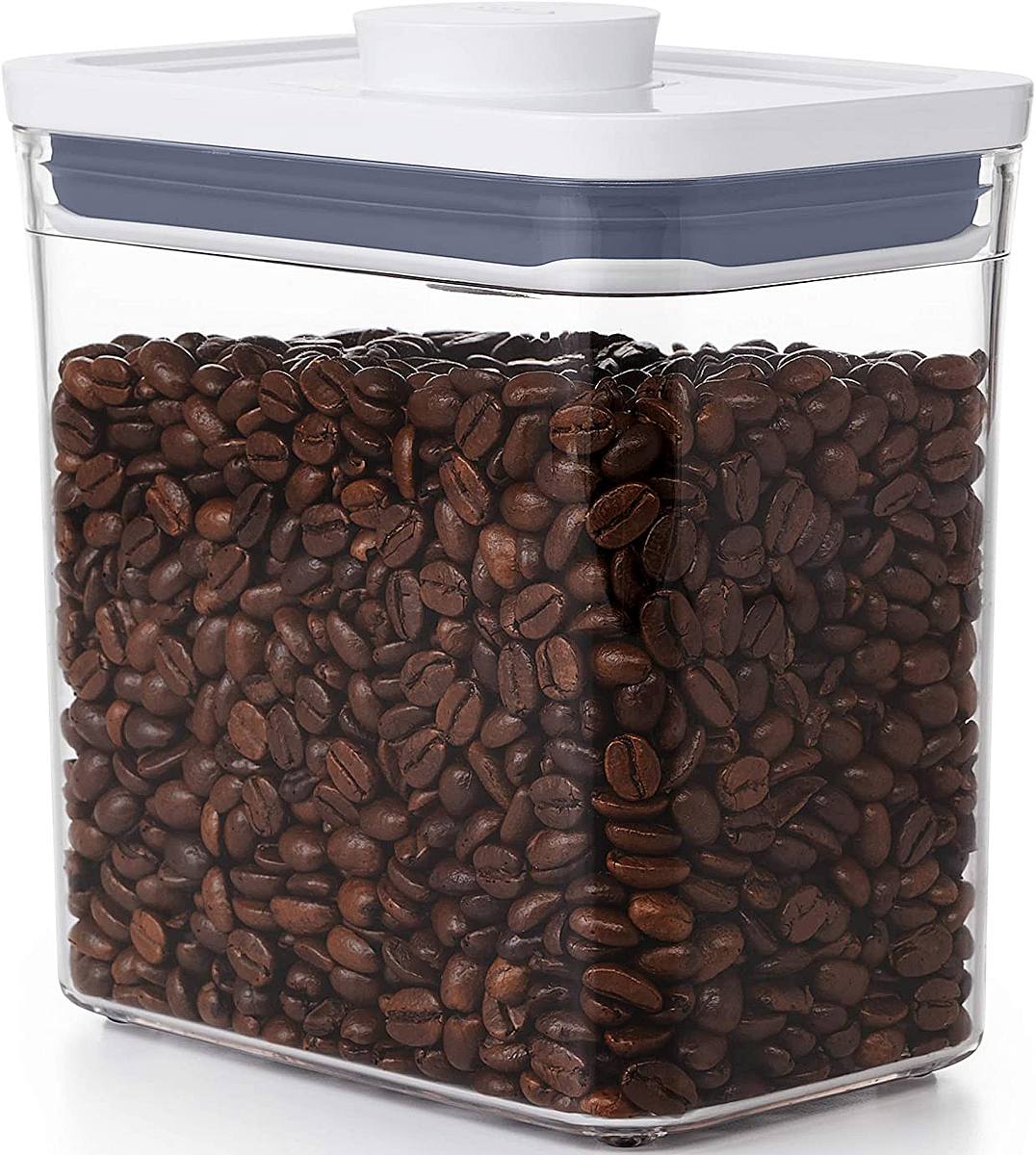Storing coffee is probably one of the least understood topics. Yet coffee storing is equally important, especially when we buy the stuff in 2 pounds bags.
If roasting, grinding, and brewing have evolved into great sciences, storing is still debated and there is a lot of bad information and a lot of half information.
In this article we are going to show you what are the best ways to store coffee beans, and why the advice varies, depending on the storage time, and a few other variables.

How To Store Coffee Beans or Grounds
Keeping coffee beans fresh is a problem we can handle in various ways. Fresh coffee is a must these days, especially when we buy expensive beans. There would be no point to buy a single origin if and let it go stale to the point where it's bland as a salt less diet.
Aficionados and enthusiasts either roast themselves, or buy from the local roaster every week. If you get a subscription from your favorite roaster, you should be covered. However, not everybody wants a subscription, for various reasons. So let's see how can we store coffee.
Roasted Coffee Beans Shelf Life

Unroasted coffee beans have a long shelf life, you can store them for months in a cool dry place, such as the pantry.
Coffee beans have a shelf life of about 2 weeks, after we roasted them. Darker roasts expire faster, because the cell walls integrity is broken to a higher degree. This allows volatile compounds to travel to surface and dissipate. Those oily beans are great to pull a tasty espresso shot, but they expire fast, so you need to use them fast, or store them properly.
The 2 pound bag you just bought, will be fresh for two weeks, and after the two weeks you will start to use stale coffee.
This means you need to find some ways to store your beans so that they last more than 2 weeks. Let's bust some myths, and let me tell you from the start, I'll bust the no fridge coffee storing myth. Just stick with me and you'll understand coffee storing better. The freezer coffee storage a controversial subject, but for no reason. Storing coffee in the freezer is the best way to store them long term. But let's dive into the subject and you'll see that the freezer is great for storing beans.
A Word on Coffee Packaging
Coffee packaging has evolved a lot, and big companies have the packaging process perfected. This is why when you buy from a reputable roaster such as Illy, or Lavazza, you look at the “best by date”, rather than roast date. They flush the beans with Nitrogen, or vacuum pack them, so there is no oxygen in the bag.
Small roasters cannot afford packaging equipment like that, so when you buy from your local roaster ask for the roast date. They should have that stamped on the bag. If you can't verify the roast date, when buying from a small roaster, just don't buy. There is a considerable risk that you aren't buying fresh coffee beans.
When you buy from a local roaster, if they package in simple paper bags, they will expire faster. If they use valve-sealed bags, they will last a bit longer. Coffee releases carbon dioxide after roasting. The carbon dioxide will slowly displace the air in the bag, acting as a natural preservative, similarly to the nitrogen flush.
Airtight Container – Coffee Canisters

All experts agree that one of the most important things when storing coffee is to make sure the recipient is airtight, and no oxygen is allowed to get in the bag or can.
But you still need to take coffee from your recipient every day, and every day there will be an air exchange in the recipient. That unless you are a restaurant or a coffee shop and you finish your coffee bag by the end of the day.
The airtight container kept in the pantry is the perfect solution for up to 2 weeks. As we mentioned, oily beans might expire before that, so maybe 10 days, give or take.
There are plenty of options on the market, we recommend you look for a vacuum canister. These are equipped with a valve and a small pump that removes the air from the canister for the freshest coffee. The vacuum minimizes the exposure to air between brews, hence a prolonged shelf life.
Avoid clear glass, or plastic containers, if you can. A constant exposure to light will facilitate the migration of the oils to the beans' surface. But if your coffee canister goes in a dark place such as the pantry, they are acceptable.
Freezing Coffee Beans – Is It Good or bad?
Many experts will tell you that storing coffee in the pantry is the right way to do it. The reality is that storing coffee in the fridge or in the freezer is perfectly fine. And this should be your choice for storing long term. Cold temperatures will immobilize volatile compounds in the bean. So we will preserve the good stuff that gives coffee flavor. So where does the myth come from?
There is some truth to the myth, but that was distorted. The reality is that by taking coffee out of the fridge or freezer every day, will expose the beans to temperature variances. Air moisture will condensate on the cold beans and these will absorb some of the condensation. If you do this a few times to a coffee bag, is fine. There will not be enough condensation by the time you finish the bag.
However, if you store the beans in the fridge, or the freezer and you take them out on a daily basis, condensation will add up.
So freezer or fridge, it's all good as long as you open the bag a few times only.
How to Store Coffee Beans in the Freezer
Fridge, or freezer, is all the same, only the freezer keeps you coffee fresh longer. But you just can't put the beans in the freezer in a paper bag, or an open container. Ideally, you should have an airtight can. If the bag they came in is resealable, you can use that bag.
If you don't use an airtight container, you ill risk a freezer burn, or your beans will absorb food odors from the fridge. The last thing you want to small in your morning coffee is a soup aroma.
The original packaging varies a lot, but in general, if it has a one way valve, it's a good candidate for using as freezer container. Just make sure you reseal the bag tightly. If you squeeze the bag, and the air comes out through the valve, the bag is sealed properly. If not, inspect the resealing, or simply use an airtight can.
A decent alternative is a mason jar. The mason jar can be sealed tightly, and since there is no light exposure in the freezer, you should be fine.
Freezer and Pantry Storage – The Best For Large Coffee Bags
I buy large coffee bags. Two pounds bags, 1 Kg bags from Italian roasters, or even from my local roaster. Although when I buy from the local roaster, I usually buy in smaller quantities.
So when I buy a large bag, I move beans for 10 days into an airtight canister, which I keep in the pantry. The rest of the bag goes in the freezer, into a large airtight container. Every ten days I move coffee from the large canister in the freezer, into a small canister in the pantry.
This combination of two methods, the freezing and airtight storing is the best way to go. Freezing is the best way to store beans long term, there is no doubt, no matter what “the experts” say. Here is a link to an article that shares the results of an experiment on frozen vs non-frozen coffee beans: To Freeze or Not to Freeze.
This is the only resource that uses an experiment to support the conclusion. The guy actually wanted to prove that freezing is bad for beans, but he just couldn't.
The National Coffee Association says that freezing coffee is bad for coffee beans because contact with moisture will deteriorate coffee. As we discussed, there is some truth in this affirmation, however, if you handle beans as I explained, they will be perfect for a few months.
The key is to return the beans in the freezer as fast as possible, after using transferring into the pantry canister.
How to Store Ground Coffee?
First of all, try to not buy pre-ground coffee at all. If you use that coffee in a few days, it's not as bad. But freshly ground coffee is the best way to avoid stale, insipid, odorless coffee.
Ground coffee has more surface area that is exposed to the air. Moisture and oxygen have a devastating effect on coffee.
Grind only what you brew. But if you must store it, here are some advice. Ground coffee cannot be stored in the freezer. Because ground coffee has a lot of more contact surface and absorbs humidity very easy, we need to avoid temperature changes that will allow condensation.
The best way to store ground coffee is in airtight containers at room temperature or slightly lower. Again, avoid drastic temperature changes when handling. The best routine is like in the case of beans, two airtight containers, one for daily use, containing coffee for a few days, and one for long-term storage, from which you transfer weekly into the other can.
How To Store Coffee Beans Long Term

If you want to store coffee long term, the best option is to store green coffee. Green coffee is a lot more stable than the roasted beans, and allows longer shelf time. You still need special packaging and a low temperature to avoid any problems, but you can safely store coffee for years this way.
The procedure implies packaging your espresso beans in plastic bags that will be vacuumed immediately. Then all the bags resulted will go in the freezer.
When you take your coffee beans from the storage, you need to let the package warm up, then you can roast your coffee beans as you would normally do. They will be as fresh as possible, with the best aroma possible. In all fairness, with green beans you could probably store them in a pantry, using an airtight container.
Green coffee beans are pretty stable, and they can be kept this way for at least a few months. I personally don't roast my beans, because I don't have the time. I prefer to buy them roasted.
If you don't want to roast your beans, and you want to store them long term, you will follow the same procedure. The difference is when you take them off the storage for use.
When you take the beans out of the freezer, you will need to transfer them directly in an airtight container, to avoid contact with the air/oxidation. Just keep in mind that long-term storing roasted beans is not the best option anyway. The roasted beans start to change the second they get out of the roasting pan/facility.
One interesting thing about storing coffee in the freezer is the release of the oils. Once you bring them to room temperature, the beans start to release the oils within a day or two. The same beans start to release the oils within a week or two, if not frozen.
That means you can keep them in the freezer for a long time without any adverse effect, but once you got them out you have to use them fast. When you open a new bag, you can probably keep in your airtight coffee container enough for 10 days, before storing in the freezer. However, when you take from the freezer you need to take only for a few days.
